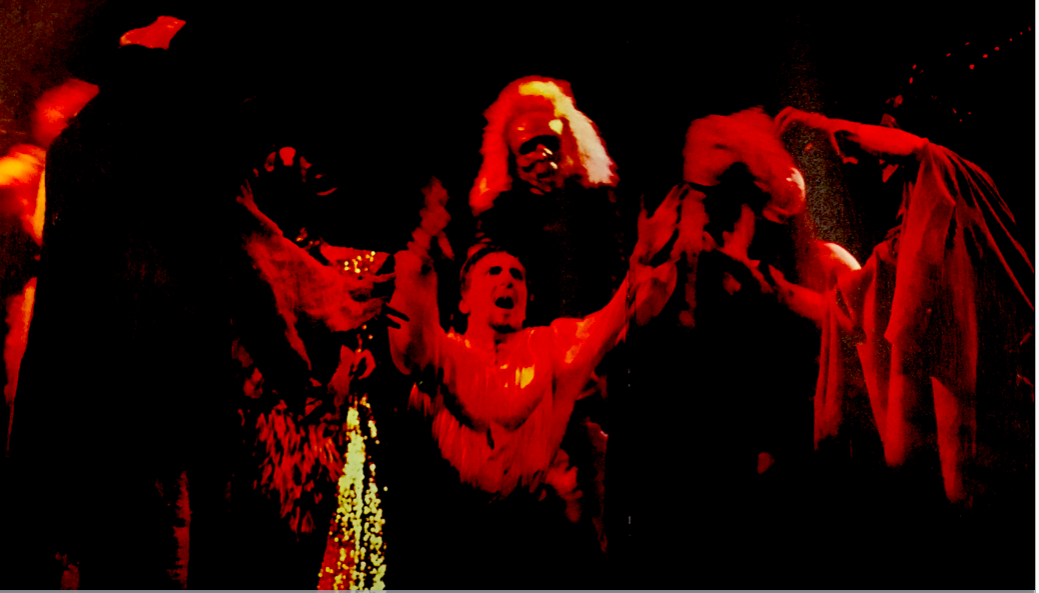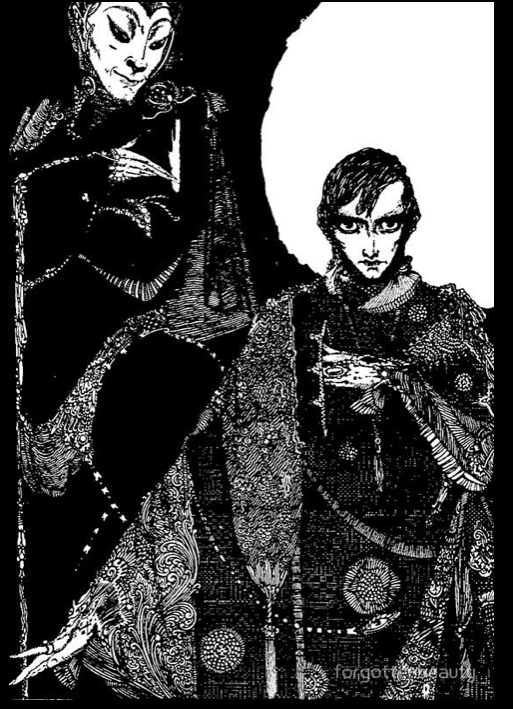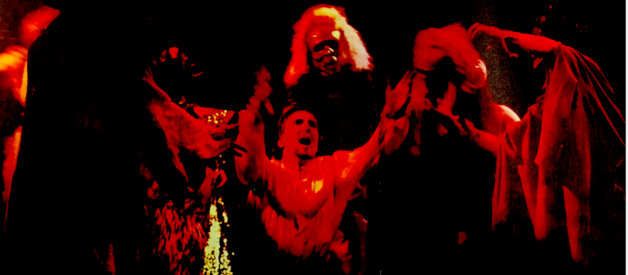 A late-1960s British National Theatre stage production of Marlowe?s Dr Faustus
A late-1960s British National Theatre stage production of Marlowe?s Dr Faustus
The origin of a popular myth?and pact
 Irish artist Harry Clarke?s 1925 depiction of Goethe?s Faust with Master
Irish artist Harry Clarke?s 1925 depiction of Goethe?s Faust with Master
Marlowe was writing partly in the vein of a backlash against the occult revival of Renaissance. His drama is a lyrically beautiful if simplistic morality tale about the dangers of dabbling in dark forces, for which his protagonist Dr Faustus pays with damnation. Goethe?s play Faust is more psychologically and ethically complex. In it, Mephistopheles and Faust circle each other, sharklike, neither quite trusting the other. They finally strike a bargain in which the Dark Lord agrees to give Faust unbounded happiness and knowledge ? with a peculiar catch that binds the devil to his word: if Faust ever dwells in a moment so splendid that he wants to live in it forever only then will he go to his death and vest his soul in service to Satan. That moment never quite occurs and the sorcerer is saved.
Was there a real Faust? Yes, but historians have never fully agreed on just who it was. A rough consensus has settled around Johann Georg Faust, a German alchemist, astrologer, theologian, and magician who died around 1541. Central European legend held that the mysterious figure made a pact with Satan for knowledge and power. This Faust probably formed the model for Marlowe?s stage character.
Lots of modern figures have been rumored to ?sell their souls,? including bluesman Robert Johnson (1911?1938). As the legend persistently tells it, the great guitarist met the devil at a crossroads and vowed to serve him for eternity in exchange for preternatural musical skills. While Johnson did record a song called ?Crossroads,? it was not about soul-selling but hitchhiking. However, another blues master, Tommy Johnson (1896?1956), performed a similar ? though more elusive ? operation, recounted by his brother LeDell in an interview:
If you want to learn how to make songs yourself, you take your guitar and you go to where the road crosses that way, where a crossroads is. Get there, be sure to get there just a little ?fore 12 that night so you know you?ll be there. You have your guitar and be playing a piece there by yourself?A big black man will walk up there and take your guitar and he?ll tune it. And then he?ll play a piece and hand it back to you. That?s the way I learned to play anything I want.
But you?ll notice that Ledell does not specifically reference Tommy engaging in soul-selling or encountering Satan. Rather, Tommy Johnson drew upon a practice found in the African-American magical tradition called hoodoo. This should not be confused with the Afro-Caribbean religion properly called Voodoo, which with it is often and mistakenly conflated. (I write further about this in my Occult America.) Within the framework of hoodoo, Tommy, at least in his brother?s account, was practicing a retention of Western and Central African magic in which a seeker can summon a deific protector, sometimes in form of Ellegua or Eshu, who guards the crossroads (and all travelers) and dispenses wisdom and artistry, not dissimilar to the Hellenic gods Hermes or Mercury.
Say it ain?t so, Bob.
A sketchy but nonetheless intriguing online legend has it that Bob Dylan followed in Tommy Johnson?s footsteps and sold his soul to Satan for fame and artistry, as seen in this 2004 clip (left) from 60 Minutes. This is a shaky interpretation. But Dylan, the perennial trickster (in the mold of Hermes and Eshu), won?t let on for sure.

Where, finally, does the idea of selling your soul to Satan originate from, at least in the Western mind? Well, the likeliest and earliest source is the Old Testament book Isaiah 28:15, in which nonbelievers are said to elude consequence by striking a deal with Dark Forces. You can read a 1985 Jewish Publication Society translation at left. The term Sheol references the Hebrew concept of the after-world, not necessary conflated with later notions of Hell. Although concepts of a personified Satan had not taken shape in the biblical era (that?s a topic for another day), the notion of a maleficent pact spread among early Christians and probably formed the basis of ?selling your soul.?
As a historian and participant in esoteric movements, I never dodge the elephantine question: does it work? Well, I?ve provided the background and tools. Never allow past convention to curb current experiment.
______
I value your reading time. You would like to explore more articles like this one please visit:

